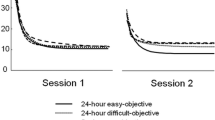Abstract
The “overjustification effect” is manifested in decreased interest in an activity as a result of having been rewarded for participation in the activity. According to attribution theory's “discounting principle,” decreased interest occurs because the subject discounts the role of intrinsic motivation when a salient extrinsic reward is present. An alternative analysis based on the “competence principle” suggests that only rewards that convey no message of competence foster the overjustification effect, while manipulations that do convey competence information do not. A study crossing Reward (no reward-monetary reward) and Task Difficulty (hard-easy) supported the competence analysis. Subjects who succeeded on the hard task and thus felt competent manifested higher subsequent interest in the task. Consistent with the competence analysis, presence or absence of reward did not influence subsequent interest in the task.
Similar content being viewed by others
References
Anderson, R., Manoogian, S., & Reznick, J. The undermining and enhancing of intrinsic motivation in preschool children.Journal of Personality and Social Psychology 1976,34 915–922.
Arkes, H. R. Competence and the maintenance of behavior.Motivation and Emotion 1978,2 201–211.
Arnold, H. J. Effects of performance feedback and extrinsic reward upon high intrinsic motivation.Organizational Behavior and Human Performance 1976,17 275–288.
Chadwick, B. A., & Day, R. C. Systematic reinforcement: Academic performance of under-achieving students.Journal of Applied Behavior Analysis 1971,4 311–319.
deCharms, R.Personal causation. New York: Academic Press, 1968.
Deci, E. L. Effects of externally mediated rewards on intrinsic motivation.Journal of Personality and Social Psychology 1971,18 105–115.
Deci, E. L. Intrinsic motivation, extrinsic reinforcement, and inequity.Journal of Personality and Social Psychology 1972,22 113–120.
Deci, E. L.Intrinsic motivation. New York: Plenum Press, 1975.
Deci, E. L., Cascio, W. F., & Krusell, J. Cognitive evaluation theory and some comments on the Calder-Staw critique.Journal of Personality and Social Psychology 1975,31 81–85.
Dollinger, S. J., & Thelen, M. H. Overjustification and children's intrinsic motivation: Comparative effects of four rewards.Journal of Personality and Social Psychology 1978,36 1259–1269.
Hewett, F. M., Taylor, F. D., & Artuso, A. A. The Santa Monica project: Evaluation of an engineered classroom design with emotionally disturbed children.Exceptional Children 1969,35 523–529.
Karniol, R., & Ross, M. The development of causal attributions in social perception.Journal of Personality and Social Psychology 1976,34 455–464.
Karniol, R., & Ross, M. The effect of performance relevant and performance irrelevant rewards on children's intrinsic motivation.Child Development 1977,48 482–487.
Kelley, H. H. The process of causal attribution.American Psychologist 1973,28 107–128.
Lepper, M. R., & Greene, D. Overjustification research and beyond: Toward a means-end analysis of intrinsic and extrinsic motivation. In D. Greene & M. R. Lepper (Eds.),The hidden costs of reward. Hillsdale, New Jersey: Lawrence Erlbaum Associates, 1978.
Lepper, M. R., Greene, D., & Nisbett, R. E. Undermining children's interest with extrinsic rewards: A test of the overjustification hypothesis.Journal of Personality and Social Psychology 1973,28 129–137.
Masters, J. Social comparison by young children.Young Children 1971,27 37–60.
Masters, J. Effects of success, failure, and reward outcome upon contingent and noncontingent self-reinforcement.Developmental Psychology 1972,7 110–117.
Miller, R. L., Brickman, P., & Bolen, D. Attribution versus persuasion as a means of modifying behavior.Journal of Personality and Social Psychology 1975,31 430–441.
Nelson, S. A., & Dweck, C. S. Motivation and competence as determinants of young children's reward allocation.Developmental Psychology 1977,13 192–197.
Smith, M. C. Children's use of multiple sufficient cause schema in social perception.Journal of Personality and Social Psychology 1975,32 737–747.
Weiner, B., & Kukla, A. An attributional analysis of achievement motivation.Journal of Personality and Social Psychology 1970,15 1–20.
Weiner, M. J., & Mander, A. M. The effects of reward and perception of competency upon intrinsic motivation.Motivation and Emotion 1978,2 67–73.
White, R. W. Motivation reconsidered: The concept of competence.Psychological Review 1959,66 317–330.
Author information
Authors and Affiliations
Additional information
This research has been supported by a grant from the Ohio University Research Fund. I am grateful to Mark Henault, who served very ably as the experimenter. The hard work of Joel Ghitman and Craig Alexander is also gratefully acknowledged.
Rights and permissions
About this article
Cite this article
Arkes, H.R. Competence and the overjustification effect. Motiv Emot 3, 143–150 (1979). https://doi.org/10.1007/BF01650599
Issue Date:
DOI: https://doi.org/10.1007/BF01650599




